
We're Only in It for the Money is the third album by American rock band the Mothers of Invention, released on March 4, 1968, by Verve Records. As with the band's first two efforts, it is a concept album, and satirizes left- and right-wing politics, particularly the hippie subculture, as well as the Beatles' album Sgt. Pepper's Lonely Hearts Club Band. It was conceived as part of a project called No Commercial Potential, which produced three other albums: Lumpy Gravy, Cruising with Ruben & the Jets, and Uncle Meat.

Uncle Meat is the sixth album by the Mothers of Invention, and seventh overall by Frank Zappa, released as a double album in 1969. Uncle Meat was originally developed as a part of No Commercial Potential, a project which spawned three other albums sharing a conceptual connection: We're Only in It for the Money, Lumpy Gravy and Cruising with Ruben & the Jets.

Civilization Phaze III is the sixty-third album by Frank Zappa, released posthumously as a double album on October 31, 1994. It was the first studio album of new material from Zappa since 1986's Jazz from Hell. The album marks the third part of a conceptual continuity that started with We're Only in It for the Money (1968), with the second part being a re-edited version of Zappa's 1967 album Lumpy Gravy. Zappa described the album as a "two-act opera", but in lieu of traditional recitatives and arias, it alternates brief spoken word passages with musical numbers created on a Synclavier using a combination of sampled and synthesized sounds. Much of the sampled material in the second half of the album was originally recorded by Ensemble Modern and other musicians to Zappa's specifications.

Fillmore East – June 1971 is a live album by The Mothers, released in 1971. It is the twelfth album in Frank Zappa's discography, and was produced by Zappa and mixed by Toby Foster.
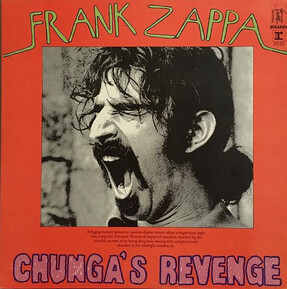
Chunga's Revenge is the third solo album, and eleventh album counting the work of his band The Mothers of Invention, by Frank Zappa, released on October 23, 1970. Zappa's first effort of the 1970s marks the first appearance of former Turtles members Mark Volman and Howard Kaylan - nicknamed Flo & Eddie - on a Zappa record, and signals the dawn of a controversial epoch in Zappa's history. Chunga's Revenge represents a shift from both the satirical political commentary of his 1960s work with The Mothers of Invention, and the jazz fusion of Hot Rats.
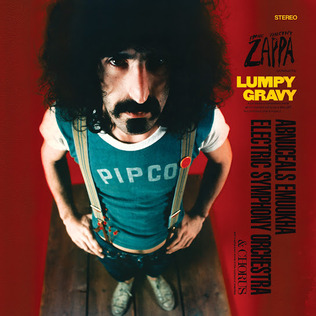
Lumpy Gravy is a 1968 solo album by Frank Zappa, written by Zappa and performed by a group of session players he dubbed the Abnuceals Emuukha Electric Symphony Orchestra & Chorus. Zappa conducted the orchestra but did not perform on the album. It is his fourth album overall: his previous releases had been under the name of his group, the Mothers of Invention.

Cruising with Ruben & the Jets is the fourth album by the Mothers of Invention, and fifth overall by Frank Zappa, released under the alias Ruben and the Jets. Released on December 2, 1968 on Bizarre and Verve Records with distribution by MGM Records, it is a concept album, influenced by 1950s doo-wop and rock and roll. The album's concept deals with a fictitious Chicano doo-wop band called Ruben & the Jets, represented by the cover illustration by Cal Schenkel, which depicts the Mothers of Invention as anthropomorphic dogs. It was conceived as part of a project called No Commercial Potential, which produced three other albums: Lumpy Gravy, We're Only in It for the Money and Uncle Meat.

Weasels Ripped My Flesh is the eighth album by the American rock group the Mothers of Invention, and the tenth overall by Frank Zappa, released in 1970. Following the Mothers' late 1969 split, Zappa assembled two albums - Burnt Weeny Sandwich and Weasels Ripped My Flesh - from unreleased studio and live recordings by the band, as well as some outtakes/leftovers from his 1969 solo album Hot Rats. While Burnt Weeny Sandwich focuses mostly on studio recordings and tightly arranged compositions, Weasels Ripped My Flesh focuses mostly on live recordings and loose/improvisational pieces.

The Persuasions were an American a cappella group that formed in Brooklyn, New York in 1962, singing under corner streetlights and in subway corridors. Their style combined gospel, soul, early rock, and jazz into melodic five-part harmonies. Since being discovered by Frank Zappa, the Persuasions have released 23 studio albums to date.

This is a list of albums by Frank Zappa, including all those credited to the Mothers of Invention. During his lifetime, Zappa released 62 albums. Since 1994, the Zappa Family Trust has released 67 posthumous albums as of September 2024, making a total of 129 albums/album sets.
Xenochrony is a studio-based musical technique developed at an unknown date, but possibly as early as the early 1960s, by Frank Zappa, who used it on several albums. Xenochrony is executed by extracting a guitar solo or other musical part from its original context and placing it into a completely different song, to create an unexpected but pleasing effect. He said that this was the only way to achieve some rhythms.

London Symphony Orchestra is a pair of albums by Frank Zappa, featuring his original symphonic compositions conducted by Kent Nagano. They were recorded at the same sessions in January 1983, and originally released as London Symphony Orchestra, Vol. I in 1983, London Symphony Orchestra, Vol. II, in 1987, and later combined and reissued on a Rykodisc CD as London Symphony Orchestra Vol. I & II in 1995.
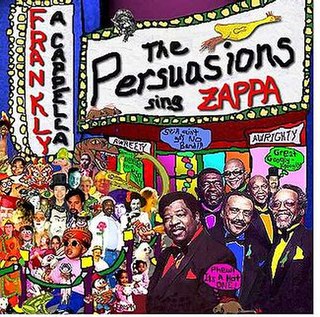
Frankly A Cappella: The Persuasions Sing Zappa is a 2000 album by the singing group The Persuasions. Frank Zappa heard them over the phone while they were singing in a record shop on the East Coast and flew them out to L.A. to record their first LP, in 1969, for Zappa's label. The album was the brainchild of Rip Rense, a friend of Zappa, as a tribute to the late composer. Rense executive produced and worked with lead singer/arranger Jerry Lawson on selecting the tracks and guest artists, who included Zappa alums Bruce Fowler, Robert Martin, Mike Keneally. Gary Mankin and Lawson co-produced the music, and Gail Zappa had final approval of the project. All arrangements by Jerry Lawson. The album is the first of several in which The Persuasions paid tribute to the songs of a specific group or artist.
As an icon of counterculture and underground rock the American rock musician and composer Frank Zappa has been featured and referenced in various different media.
Pal Recording Studio (1957–1964) was an independent recording studio that operated in Cucamonga, California, an unincorporated community in San Bernardino County that later merged with the communities of Alta Loma, and Etiwanda to form Rancho Cucamonga. The studio was started by engineer/innovator Paul Buff. It was known for its instrumental Surf music recordings such as "Wipe Out" and the original demo recording of "Pipeline." It was located first at 8020 North Archibald Avenue and later moved a few doors down to 8040.
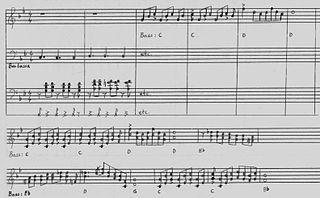
"Take Your Clothes Off When You Dance" is a song written by Frank Zappa, with the first officially available version being recorded and released by The Mothers of Invention on their 1968 album We're Only in It for the Money. The song was originally recorded as an instrumental by Frank Zappa in 1961 at Pal Recording Studio.

An Evening with Wild Man Fischer is a 1969 double LP album by Wild Man Fischer. It was produced by Frank Zappa and released on his Bizarre record label.

The Lumpy Money Project/Object is a compilation album by Frank Zappa. Released posthumously on January 23, 2009 as Official Release #85, it compiles the releases Lumpy Gravy and We're Only in It for the Money with previously unreleased material, with the overall package serving as an audio documentary of the production of the two albums, which share conceptual continuity themes. It is project/object #2 in a series of 40th Anniversary FZ Audio Documentaries, following MOFO (2006).

The Old Masters is a box set series by Frank Zappa, released in three volumes on Barking Pumpkin Records from April 1985 to December 1987, consisting of studio and live albums by Zappa and The Mothers of Invention originally released from 1966 to 1976 on other labels, as well as "Mystery Discs" which contained previously unreleased material. The graphics on all three sets was airbrush illustrated by Larry Grossman. 200 Motels was not included in the series, as it was the only Zappa/Mothers album for which Zappa was unable to secure the rights.
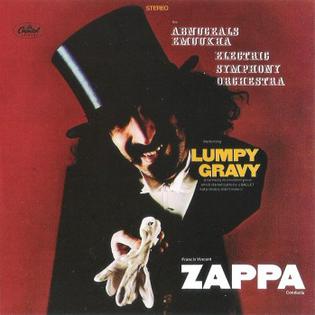
Lumpy Gravy, also known as Lumpy Gravy (Primordial), is the recalled original debut solo album by Frank Zappa. It is an entirely orchestral recording written by Zappa and performed by a group of session players he dubbed the Abnuceals Emuukha Electric Symphony Orchestra. Zappa conducted the orchestra but did not perform on the album. It was commissioned and briefly released, on August 7, 1967, by Capitol Records in the 4-track Stereo-Pak format only and then withdrawn due to a lawsuit from MGM Records. MGM claimed that the album violated Zappa's contract with their subsidiary, Verve Records, and the album was recalled.
















